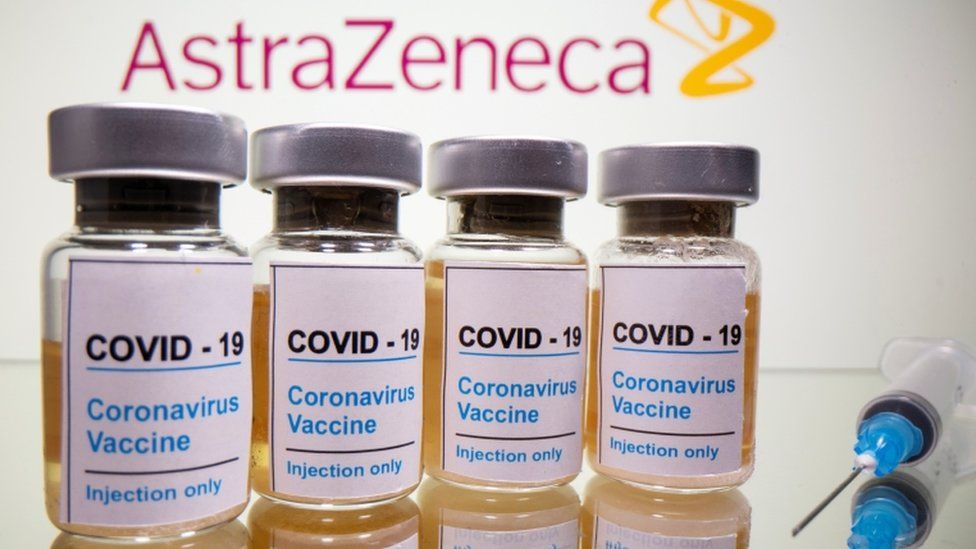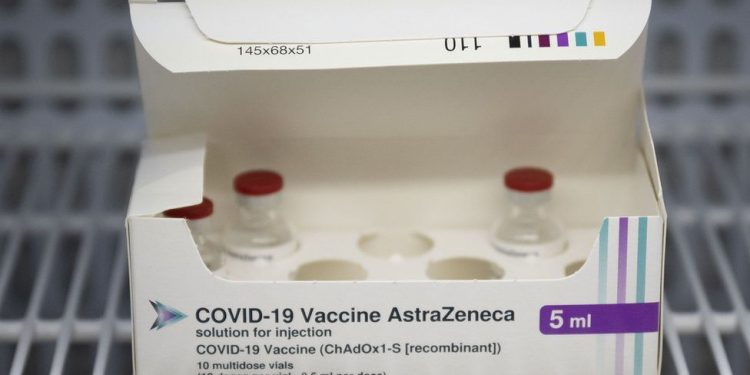The UK government is facing questions over coronavirus vaccine supply after warnings of a significant reduction. It is understood a delivery of millions of doses of the Oxford-AstraZeneca jab, produced by the Serum Institute of India, has been held up by four weeks.

The NHS warned of a reduction in supply in England in April in a letter to local health organisations. The Department of Health insists it is still on track to offer a first dose to all adults by the end of July.
Health Secretary Matt Hancock said the UK was “ahead of schedule” to offer a first dose to all people aged over 50 by 15 April, at a briefing at Downing Street on Wednesday. More than 25 million people in the UK have had a first dose of a Covid vaccine, while around 1.7 million have had a second jab.
After opening up appointments to all over 50s on Wednesday, the NHS in England was then told not to offer jabs to younger age groups throughout April. media captionHealth Secretary Matt Hancock said vaccine supply is “always lumpy, but we’re on course”
The Serum Institute is the world’s largest manufacturer of vaccines and is making one billion doses of the AstraZeneca jab this year for low and middle income countries. Earlier this month, it agreed to supply 10 million doses for the UK, but only half of these will arrive this month with the rest delayed for several weeks.
These supplies were always part of the contract and the UK is not taking vaccines away from supplies for lower-income countries. All the rest of the UK’s AstraZeneca doses are being produced domestically and the company says there are no supply issues.
Pfizer, which produces its vaccine in Belgium, says its deliveries to the NHS are also on track. Although, on Wednesday, European Commission President Ursula von der Leyen said if Covid vaccine supplies in Europe do not improve, the EU “will reflect whether exports to countries who have higher vaccination rates than us are still proportionate”.
We were always warned supply was fragile – and these developments are a reminder of that. The UK has its own plants that are supplying one to two million doses of the AstraZeneca vaccine each week.
There are also stocks coming from Pfizer’s Belgium plant – these would be the ones that would be susceptible to any restrictions on exports the EU is threatening. The Indian supplies were supposed to give the UK the “bumper” end to March, allowing the government to push ahead with vaccination of the under-50s within weeks.
This has now been put on hold, given significant numbers will need their second doses from the start of next month. The government is still on track to hit its target to offer all adults a vaccine by the end of July.
By late Spring the first doses of Moderna – the third vaccine to have been approved in the UK – should start arriving. But the delay to the second shipment from India means rollout is going to take a little longer than was hoped at the start of this week.
Mr Hancock is due to give a statement to MPs in the Commons later on Thursday. Shadow health secretary Jonathan Ashworth tweeted that people “across the country” would be “anxious and worried” about news of delays.
Labour is also backing a call from bereaved families for a public inquiry into the handling of the Covid pandemic.In a letter to Michael Gove, Rachel Reeves asks for his commitment to a public inquiry once the end of the government roadmap for leaving lockdown restrictions is reached. Boris Johnson has previously promised an “independent inquiry” into the pandemic.
In addition, the European Medicines Agency (EMA) is due on Thursday to release the findings of an investigation into cases of blood clots in a handful of Oxford-AstraZeneca jab recipients.Several European countries have paused the use of the vaccine but the regulator has said there was “no indication” it caused the clots.
The World Health Organization has urged countries not to halt vaccinations. A further 141 people in the UK have died within 28 days of a positive test, according to figures updated on Wednesday from the UK government. A further 5,758 people have tested positive. [BBC]















